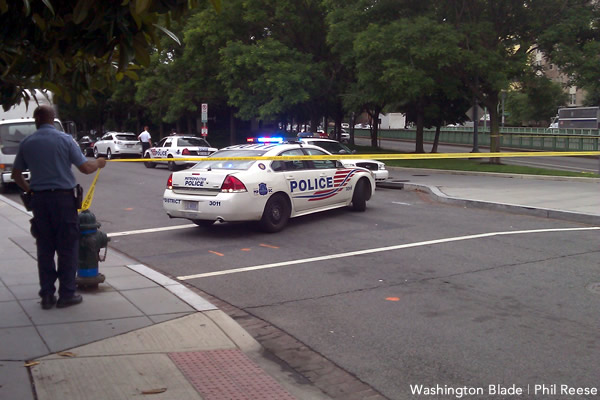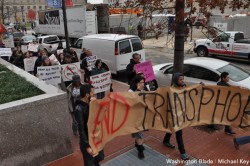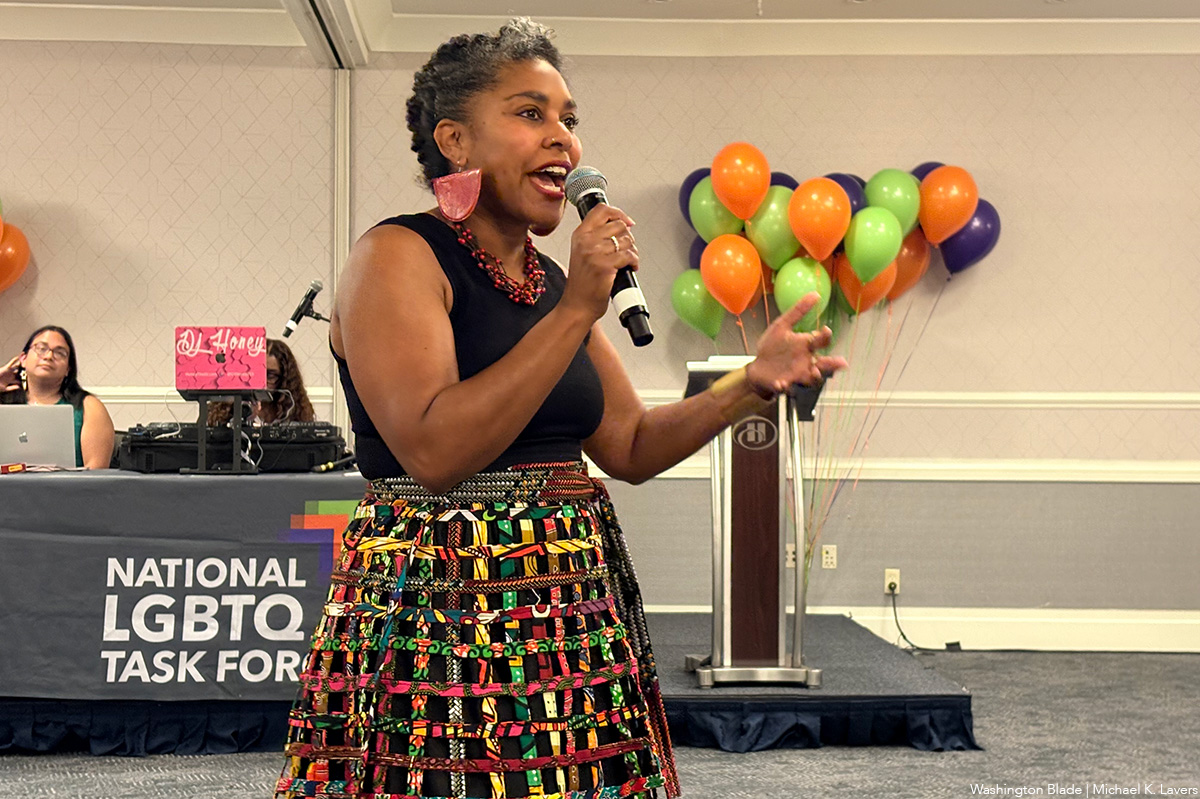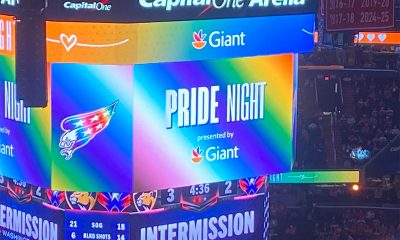Local
D.C. cop convicted of assault with dangerous weapon in trans shooting case
Suspended officer acquitted on more serious charge of assault with intent to kill while armed


In a development likely to raise concern among LGBT activists, the jury found D.C. police officer Kenneth Furr not-guilty of all charges related to the firing of his gun through the windshield of a car with the five people inside. (Washington Blade photo by Phil Reese)
An off-duty D.C. police officer accused of firing his service revolver into a car occupied by three transgender women and two male friends in August 2011 was convicted Friday of assault with a dangerous weapon and solicitation for prostitution.
But a D.C. Superior Court jury also found Officer Kenneth Furr, 48, not guilty of six other charges, including the more serious offense of assault with intent to kill while armed.
In a development likely to raise concern among LGBT activists, the jury found Furr not-guilty of all charges related to the firing of his gun through the windshield of the car with the five people inside.
Although three of them suffered non-life-threatening bullet wounds and two weren’t hit, prosecutors said any of the five could have been killed.
“I really wonder what the jury heard and how they could decide not to find intent to kill,” said transgender activist Jeri Hughes. “You don’t fire a gun several times at people and not have intent to kill.”
“It sounds like the defense did a good job in demonizing the victims,” said Hughes, who was among many LGBT activists who viewed the incident as another in series of violent attacks against LGBT people in the city over the past several years.
Police and prosecutors said the incident started with a verbal dispute between Furr and one of the transgender women and her friends when Furr became angry and “aggressive” after the woman refused his offer of money for sex in the area of 5th and K St., N.W.

An increase in violence against trans individuals have prompted activists to become more visible. (Washington Blade file photo by Michael Key)
Superior Court Judge Russell Canan scheduled a sentencing hearing for Jan. 10, 2013. At the request of Furr’s attorneys, Canan released Furr into the court’s high intensity supervision program, which requires that he wear an electronic ankle bracelet and undergo alcohol and drug tests. He had been held in jail since the time of his arrest.
The verdict came after the jury deliberated for nearly nine hours over a two-day period and followed a five-day trial in which the defense disclosed information not previously made public that appears to have strengthened its claim that Furr acted in self-defense.
Assistant U.S. Attorney Lara Worm, the lead prosecutor, argued that Furr acted in a reckless manner and in anger by firing his gun into a car with five unarmed people inside.
A police arrest affidavit says the people in the car reported that Furr shouted, “You’re going to die” seconds before he began shooting. The affidavit says Furr had a blood alcohol level twice the legal limit at the time he was arrested. D.C. police charged him with driving while intoxicated, but that charge was later dropped.
“His actions that day were not okay for a police officer, a teacher or a construction worker,” the Washington Post quoted Worm as telling the jury in opening arguments.
Dispute unfolded prior to shooting
However, in a statement released after the verdict on Friday, the U.S. Attorney’s office acknowledged that the three transgender women and their two male friends chased after Furr in their car after the dispute between the two parties continued to unfold.
At one point, one of the men assaulted Furr, prompting Furr to flee in his car with the trans women and their male friends following him again, according to the U.S. Attorney’s statement.
Fearing for his life, Furr pulled out his gun and began to shoot after seeing the other car in hot pursuit, said David Knight, one of two Public Defender Service lawyers that represented Furr.
“He was alone, outnumbered and under attack,” the Post quoted Knight telling the jury. “He was threatened, assaulted and pursued by a car full of people who wanted to do him harm,” the Post quoted him as saying.
In its statement released after the verdict, the U.S. Attorney’s office said the incident began in the early morning hours of Aug. 26, 2011 when Furr, who was off duty, attempted to pick up transgender prostitutes in an area near 5th and K Streets, N.W., which has long been known as a hangout for transgender sex workers.
“His initial attempts to pick up one transgender woman were rejected by her,” the statement says. “He nonetheless followed her into a drug store at 400 Massachusetts Avenue. Once inside, he continued to solicit her in front of two of her acquaintances,” the statement says.
It says Furr got into a “verbal altercation” with one of the male acquaintances. The statement says a short time later Furr confronted the two acquaintances outside the store and, after more words were exchanged, reached into the glove compartment of his car and pulled out a semi-automatic pistol and pointed it at them.
“[T]his is the offense that led to the guilty verdict on the charge of assault with a dangerous weapon,” the U.S. Attorney’s statement says.
It says that about 20 minutes later three of the complainants from the incident at the drug store and two of their friends crossed paths with Furr in the area of 5th and K Streets, N.W.
“Furr once again was attempting to solicit a transgender prostitute,” the statement says. “The complainants pulled their car next to Furr’s, and at least one of the occupants in the complainants’ car assaulted Furr. Furr sped off and the complainants’ car followed.”
With the complainants following him, Furr drove to the intersection of First and Pierce Streets, N.W., parked his car and began firing his gun at the complainants’ car, the statement says.
“The driver of the victims’ car ducked and hit the accelerator, crashing into the side of Furr’s vehicle,” it says. “Furr then jumped on the hood of the occupied vehicle and continued shooting, firing a total of five rounds. Three of the occupants of the car suffered injuries.”
According to court records and a police report, D.C. police officers who had been on patrol in the area heard the shots being fired and rushed to the scene and placed Furr under arrest.
Furr was held in jail from the time of his arrest to the day of the verdict in his trial, when Canan agreed to release him into the high intensity supervision program while he awaits his Jan. 10 sentencing.
He faces a possible maximum sentence of ten years in prison on the assault with a dangerous weapon charge and up to 90 days on the prostitution charge.
A police spokesperson said Furr has been on indefinite unpaid leave since shortly after his arrest.
On March 7 of this year, a D.C. Superior court grand jury handed down a 9-count indictment against Furr, which included six counts of assault with a dangerous weapon, one count of assault with intent to kill while armed, and two counts of solicitation for prostitution.
At the conclusion of the trial but prior to the case going to the jury, Canan agreed to a defense motion to have the second prostitution charge dismissed, according to court records.
Court records show that the jury acquitted Furr on five counts of assault with a dangerous weapon and one count of assault with intent to kill while armed.
Defense attorney raises issue of victims’ criminal records, conflicting statements
At least two of the five victims were subjected to intense questioning from defense attorney Knight, who pointed to discrepancies between their trial testimony and testimony before the grand jury.
Chloe Alexander Moore, one of the transgender women involved in the case, testified that Furr solicited her for sex for money at the 5th and K Street, N.W. location and inside a CVS drug store nearby. In response to questioning by Knight, she acknowledged that she failed to tell the grand jury that one of her male friends assaulted Furr on the night of the incident prior to the shooting, according to the Washington Post.
Knight also brought up a solicitation charge pending against her in D.C. and asked if prosecutors in the Furr case promised her special consideration in her pending case if she cooperated by testifying against Furr.
“Of course,” the Post quoted her as saying. “Who wouldn’t want a case dropped for something you weren’t guilty of,” the Post quoted her as saying.
John Brand, one of the two male friends in the car with the three transgender women at the time of the shooting, testified that he was drunk at the time of the incident and could not remember whether he assaulted Furr.
Asked by Knight whether it is possible that he did commit the assault, Brand said, “Yes.”
Knight also asked Brand about his own past criminal record, which includes arrests for marijuana possession and distribution and an illegal gun possession charge.
Observers of criminal trials say it’s a common practice for defense attorneys to raise questions about the credibility of prosecution witnesses. It’s the job of prosecutors to remind jurors that a prior criminal record doesn’t mean a witness’s credibility should be automatically discarded, court observers have said.
Jeffrey Light, an attorney for the D.C. Trans Coalition who attended part of the trial, couldn’t immediately be reached for comment.
“This verdict does not seem unreasonable to me, especially considering the credibility issues of the government’s witnesses and the obvious strong self-defense component to the case,” said D.C. area attorney Dale Edwin Sanders.
“No one would have been injured if the victims had not chased down Furr in their vehicle after first assaulting him in an altercation in which apparently Furr did not respond aggressively…and left the scene,” said Sanders in speculating on how jurors may have viewed the incident.
Virginia
LGBTQ rights at forefront of 2026 legislative session in Va.
Repeal of state’s marriage amendment a top priority

With 2026 ramping up, LGBTQ rights are at the forefront of Virginia politics.
The repeal of Virginia’s constitutional amendment that defines marriage as between a man and a woman is a top legislative priority for activists and advocacy groups.
The Virginia Senate on Jan. 17 by a 26-13 vote margin approved outgoing state Sen. Adam Ebbin (D-Alexandria)’s resolution that would repeal the Marshall-Newman Amendment. The Virginia House of Delegates earlier this month passed it.
Two successive legislatures must approve the resolution before it can go to the ballot.
The resolution passed in 2025. Voters are expected to consider repealing the amendment on Nov. 3.
The Virginia General Assembly opened with an introduction of a two-year budget — Virginia’s budget runs biannually.
In 2024 some funding was allocated to LGBTQ causes, and others were passed over. This year’s proposed budget leaves room for funding for a host of LGBTQ opportunities. One specific priority that Equality Virginia is promoting would ensure the state budget expands healthcare for LGBTQ individuals and extending gender affirming care.
Equality Virginia Communications Director Reed Williams told the Washington Blade the organization is also focused on passing three main budget amendments, and ensuring “LGBTQ+ students and their teachers have resources to navigate and address mental health challenges in K-12 schools.”
Along with ensuring school training, the organization wants funding in hopes of “establishing enhanced competency training for Virginia’s 988 Lifeline counselors and support staff to provide affirming care for LGBTQ+ youth.” This comes after the Trump-Vance administration shut down the specific hotline for LGBTQ young people that callers could previously reach if they called 988.
On a federal level, protections and health care access for LGBTQ people has taken a hit, as the Trump-Vance administration has continued to issue executive orders affecting the health care system. LGBTQ people no longer have federal legal health care protections, so local and state politics has become even more important for LGBTQ rights groups.
Equality Virginia has urged its supporters to call their local senators and stress the importance of voting to expand health care protections for LGBTQ people. The organization also plans to hold information sessions and a lobby day on Feb. 2.
Equality Virginia is tracking bills on its website.
District of Columbia
Faith programming remains key part of Creating Change Conference
‘Faith work is not an easy pill to swallow in LGBTQ spaces’

The National LGBTQ Task Force kicked off the 38th annual Creating Change conference in D.C. this week. This year, as with years past, faith and interfaith programming remains a key part of the conference’s mission and practice.
For some, the presence of faith work at an LGBTQ+ conference may seem antithetical, and Creating Change does not deny the history of harm caused by religious institutions. “We have to be clear that faith work is not an easy pill to swallow in LGBTQ spaces, and they’re no qualms about saying that we acknowledge the pain, trauma, and violence that’s been purported in the name of religion,” Tahil Sharma, Faith Work Director for the National LGBTQ Task Force, said.
In fact, several panels at the conference openly discuss acknowledging, healing from, and resisting religious harm as well as religious nationalism, including one scheduled today titled “Defending Democracy Through Religious Activism: A panel of experts on effective strategies for faith and multi-faith organizing” that features local queer faith activists like Ebony C. Peace, Rob Keithan, and Eric Eldritch who are also involved in the annual DC Pride Interfaith Service.
Another session will hold space for survivors of religious violence, creating “a drop-in space for loving on each other in healing ways, held by Rev. Alba Onofrio and Teo Drake.”
But Sharma and others who organized the Creating Change Conference explained that “a state of antipathy” towards religious communities, especially those that align with queer liberation and solidarity, is counterproductive and denies the rich history of queer religious activism. “It’s time for us to make a call for an approach to LGBTQ+ liberation that uses interfaith literacy as a tool rather than as a weapon against us,” Sharma explained.
Recognizing a local queer faith icon
Along with the panels, fighting religious nationalism and fostering communion with aligned faith activists and communities is at heart of this year’s faith work. As Sharma shared, “the person that we’re honoring this year for the faith award is Rev. Dr. Sofía Betancourt, and Dr. Betancourt is an amazing leader and someone who really stands out in representing UUs but also representing herself unapologetically.”
Based in the Washington, D.C. area, Dr. Betancourt has more than 20 years of experience working as a public minister, seminary professor, scholar, and environment ethicist, and public theologian. Her activism is rooted in her lived identities as a queer, multiracial, AfroLatine first-generation daughter of immigrants from Chile and Panama, and has been a critical voice in advancing the United Universalism towards anti-racist and pluralistic faith work.
Creating a faith-based gathering space
Sharma also said that faith fosters a unique space and practice to encounter grief and joy. For this reason, Sharma wants to “create a space for folks to engage in curiosity, to engage in spiritual fulfillment and grounding but also I think with the times that we’re in to lean into some space to mourn, some space to find hope.” The Many Paths Gathering Space serves this purpose, where visitors can stop for spiritual practice, speak with a Spiritual Care Team member, or just take a sensory break from the bustle of the conference.
This also means uplifting and foregrounding queer religious ephemera with an ofrenda to honor those who have passed, a display of nonbinary Korean American photographer Salgu Wissmath’s exhibition Divine Identity, and the Shower of Stoles, a collection of about 1,500 liturgical stoles and other sacred regalia representing the lives of lesbian, gay, bisexual, and transgender people of faith.
The Shower of Stoles
The collection was first started in 1995 by Martha Juillerat and Tammy Lindahl who received eighty stoles that accompanied them and lent them solace as they set aside their ordinations from the Presbyterian Church. The whole collection was first displayed at the 1996 General Assembly of the Presbyterian Church in New Mexico. The stoles, according to the Task Force, “quickly became a powerful symbol of the huge loss to the church of gifted leadership.”
Each stole represents the story of a queer person who is active in the life and leadership of their faith community, often sent in by the people themselves but sometimes by a loved one in their honor. About one third of all the stoles are donated anonymously, and over three-quarters of the stoles donated by clergy and full-time church professionals are contributed anonymously.
The collection shows “not just the deep harm that has been caused that does not allow people to meet their vocation when they’re faith leaders, but it also speaks to how there have been queer and trans people in our [faith] communities since the beginning of our traditions, and they continue to serve in forms of leadership,” Sharma explained.
Explicit interfaith work
Along with creating a sacred space for attendees, hosting workshops focused on faith-based action, and recognizing DC’s rich queer religious history, Creating Change is also hosting explicitly faith services, like a Buddhist Meditation, Catholic Mass, Shabbat service, Jummah Prayer Service, and an ecumenical Christian service on Sunday. Creating Change is also welcoming events at the heart of queer religious affirmation, including a Name/Gender/Pronoun/Identity Blessing Ritual and a reading and discussion around queer bibles stories with Rev. Sex (aka Rev. Alba Onofrio).
But along with specific faith-based programs, Sharma explained, “we’re looking to build on something that I helped to introduce, which was the separation of the interfaith ceremony that’s happening this year which is a vigil versus the ecumenical Christian service which is now the only thing that takes place on Sunday morning.”
This includes an Interfaith Empowerment Service this evening and an Interfaith Institute tomorrow, along with “Sing In the Revolution,” an event where folks are invited “to actually engage in the joy and rhythm of resolution and what that looks like,” Sharma said. One of the key activators behind this work is Rev. Eric Eldritch, an ordained Pagan clergy person with Circle Sanctuary and a member of the Pride Interfaith Service planning committee.
Affirming that queer faith work is part of liberation
The goal for this year, Sharma noted, alongside holding space and discussions about faith-based practice and liberation and intentional interfaith work–is to move from thinking about why faith matters in queer liberation spaces to “how is interfaith work the tool for how we’re engaging in our understanding of de-escalation work, digital strategies, navigating a deeper visioning that we need for a better world that requires us to think that we’re not alone in the struggle for mutual abundance and liberation,” Sharma explained.
It may surprise people to learn that faith work has intentionally been part of the National LGBTQ+ Task Force since its beginning in the 1980s. “We can really credit that to some of the former leadership like Urvashi Vaid who actually had a sense of understanding of what role faith plays in the work of liberation and justice,” Sharma said.
“For being someone who wasn’t necessarily religious, she certainly did have a clear understanding of the relationship between those folks who are allies, those folks who stand against us, and then those folks who sit in between–those folks who profess to be of religious and spiritual background and also are unapologetically LGBTQ+,” he continued.
This year’s faith programming builds on this rich history, thinking about “a way to kind of open doors, to not just invite people in but our people to go out into the general scene of the conference” to share how faith-based work is a tool, rather than a hindrance, to queer liberation work.
Virginia
McPike prevails in ‘firehouse’ Dem primary for Va. House of Delegates
Gay Alexandria Council member expected to win 5th District seat

Gay Alexandria City Council member Kirk McPike emerged as the clearcut winner in a hastily called Jan. 20 “firehouse” Democratic primary for a seat in the Virginia House of Delegates representing Alexandria.
McPike, who was one of two gay candidates running in the four-candidate primary, received 1,279 votes or 60.5 percent, far ahead of gay public school teacher Gregory Darrall, a political newcomer who received 60 votes or 3 percent.
Former Alexandria City School Board member Eileen Cassidy Rivera came in second place with 508 votes or 24 percent and Northern Virginia criminal law defense attorney Chris Leibig finished in third place with 265 votes or 12.5 percent.
Each of the candidates expressed strong support for LGBTQ-related issues.
With less than a week’s notice, Democratic Party officials in Alexandria called the primary to select a Democratic nominee to run in the Feb. 10 special election to fill the 5th District House of Delegates seat being vacated by state Del. Elizabeth Bennett-Parker (D-Alexandria).
Bennett-Parker won the Democratic nomination for the Virginia State Senate seat being vacated by gay state Sen. Adam Ebbin (D-Alexandria), who is resigning from his seat to take a position in the administration of Democratic Virginia Gov. Abigail Spanberger, who took office on Jan. 17.
Bennett-Parker won the nomination for Ebbin’s state Senate seat in yet another firehouse primary on Jan. 13 in which she defeated three other candidates, including gay former state Del. Mark Levine.
McPike, a longtime LGBTQ rights advocate, first won election to the Alexandria City Council in 2021. He has served for 13 years as chief of staff for gay U.S. Rep. Mark Takano (D-Calif.) and has remained in that position during his tenure on the Alexandria Council. He told the Washington Blade he will continue as chief of staff until next month, when he will resign from that position before taking office in the House of Delegates.
He received the endorsement of Ebbin, U.S. Rep. Don Beyer (D-Va.), and the LGBTQ Victory Fund in his race for the 5th District Va. House seat. Being an overwhelmingly Democratic district, virtually all political observers expect McPike to win the Feb. 10 special election.
He will be running against Republican nominee Mason Butler, a local business executive who emerged as the only GOP candidate running for the delegate seat.
“Thank you to the voters of Alexandria for choosing me as the Democratic nominee in the House of Delegates District 5,” McPike said in a statement released shortly after the vote count was completed. “It is an incredible honor to have the opportunity to fight for our community and its values in Richmond,” he said.
“I look forward to continuing to work to address our housing crisis, the challenge of climate change, and the damaging impacts of the Trump administration on the immigrant families, LGBTQ+ Virginians, and federal employees who call Alexandria home,” he stated.
He praised Ebbin for his longstanding support for the LGBTQ community in the Virginia Legislature and added, “If elected to the House of Delegates in the Feb. 10 general election, I will continue to fight to protect the rights and freedoms of LGBTQ+ Virginians from my new position in Richmond.”
Gay candidate Darrall’s campaign website said he is a “proud progressive, lifelong educator, and labor leader running to put people first.” It says he is a political newcomer “with more than 20 years in the classroom” as a teacher who played a key role in the successful unionization of Fairfax Public Schools.
“He is a proud member and staunch supporter of the LGBTQIA+ community,” his website statement said.
-

 Real Estate5 days ago
Real Estate5 days agoTop buyer-friendly markets for the LGBTQ community
-

 Virginia5 days ago
Virginia5 days agoAbigail Spanberger sworn in as Va. governor
-

 Autos4 days ago
Autos4 days agoHot rod heaven: Chevy Corvette, Dodge Charger
-

 Virginia4 days ago
Virginia4 days agoTwo gay candidates running in ‘firehouse’ Va. House of Delegates primary in Alexandria



















